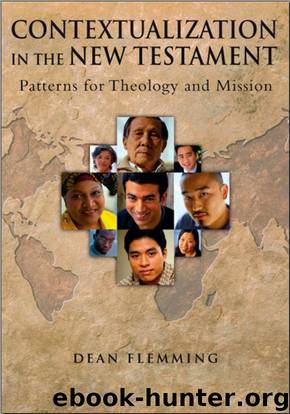Contextualization in the New Testament: Patterns for Theology and Mission by Flemming Dean;Dean Flemming

Author:Flemming Dean;Dean Flemming [Flemming Dean;Dean Flemming]
Language: eng
Format: epub
Published: 2013-08-23T15:50:00+00:00
CONCLUSION
Case studies reveal a process of dealing with difficult issues which carries implications beyond any specific answers to the problems they address. Our cases from 1 Corinthians not only give us theological and ethical content that can be applied to our own circumstances; they model the theological task. Although much could be said at this point, I will simply highlight several dimensions of Paul's missional theologizing in these two cases and 1 Corinthians as a whole that have implications for the challenge of telling and living out the good news today.
First, this letter spotlights the vital link between the gospel and holy living. Most of the contingent concerns that Paul must address in Corinth are, at least on the surface, matters of behavior and attitudes. But Paul is convinced that the Corinthians' ethical and interpersonal shortcomings betray a more fundamental failure-a deep misunderstanding of the gospel itself. So whether the immediate problem happens to be prideful boasting in status, sexual misconduct, attending parties at pagan temples, or social divisions at church "pot-luck" meals, Paul consistently appeals to the gospel to reshape the community's conduct. In a contemporary scene in which the compartmentalizing of belief and behavior seems to be no less common among Christians, it is essential that we allow the gospel to address and confront, when necessary, issues of everyday Christian conduct within our various cultural worlds. The gospel is not the gospel unless it is lived out.
Second, Paul consistently approaches the local struggles and questions of the Corinthians from the perspective of the center of the gospel, the saving story of Christ. In particular, Christ's loving self-sacrifice in the cross becomes the matrix for the story of Paul and of the Corinthians. Likewise, the reality that Christ "was raised on the third day" and its meaning for the future can serve as the basis and motive for both right thinking and right living. First Corinthians is essentially a call for Christians to become radically conformed to the gospel of Christ crucified and risen-in their way of being, believing and behaving. At the same time, the contingent situation in Corinth leads Paul to frame the gospel in particular ways. Thus, his reflections on Christ as "first fruits" (1 Cor 15:20, 23) or Christ as "last Adam" and as "life-giving spirit" (1 Cor 15:45) all come to speech because they enable the gospel of Christ to engage hearers with a powerful word that speaks to their circumstances. As we address our multiplex cultures and concerns today, we can only do so from the center of it all-the story of Jesus, our crucified and reigning Lord. But the gospel anthem must be sung in new keys if its majestic strains are to be heard in all their transforming power.
Third, the gospel calls the Corinthians to a countercultural view of the world. Although Paul recognizes the role of embracing aspects of his hearers' culture in order to advance the Christian mission (1 Cor 9:20-23), he takes a largely critical posture toward Greco-Roman culture in 1 Corinthians.
Download
This site does not store any files on its server. We only index and link to content provided by other sites. Please contact the content providers to delete copyright contents if any and email us, we'll remove relevant links or contents immediately.
| Adult Ministry | Children's Ministry |
| Counseling & Recovery | Discipleship |
| Evangelism | Missions & Missionary Work |
| Preaching | Sermons |
| Youth Ministry |
Victory over the Darkness by Neil T. Anderson(2860)
The Rape Of Nanking by Iris Chang(2813)
Chosen by God by R. C. Sproul(2161)
Habits of Grace by David Mathis(1976)
Crash the Chatterbox by Steven Furtick(1973)
Knowing God by J.I. Packer(1852)
How To Be Born Again by Billy Graham(1775)
A Prophet with Honor by William C. Martin(1717)
Gospel-Shaped Marriage by Chad van Dixhoorn(1716)
Peace with God by Billy Graham(1681)
Confronting Christianity by Rebecca McLaughlin(1587)
God's Smuggler by Brother Andrew(1542)
Angel Dreams by Virtue Doreen Virtue Melissa(1474)
Whisper by Mark Batterson(1452)
The School of Biblical Evangelism by Ray Comfort(1435)
Missionaries by Norman Lewis(1427)
The Truth War by John MacArthur(1422)
The Poems of Rowan Williams by Rowan Williams(1354)
Do Greater Things by Robby Dawkins(1324)
